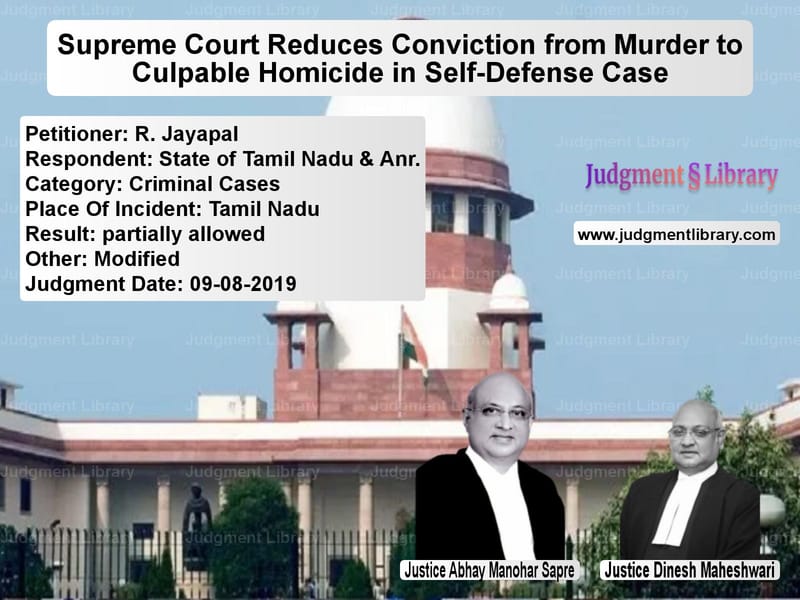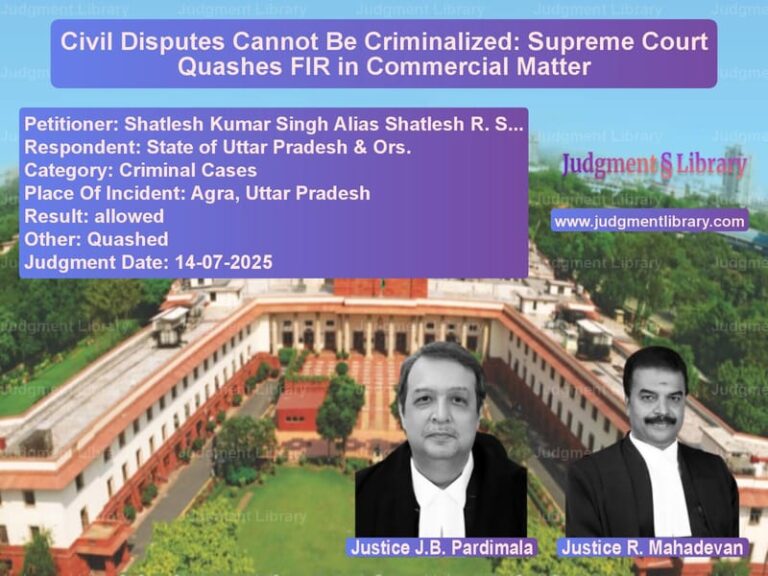Supreme Court Reduces Conviction from Murder to Culpable Homicide in Self-Defense Case
The case of R. Jayapal vs. State of Tamil Nadu & Anr. involved the legal interpretation of self-defense and sudden provocation in a murder conviction. The Supreme Court, in its judgment dated 9th August 2019, modified the appellant’s conviction from murder under Section 302 IPC to culpable homicide not amounting to murder under Section 304 Part-I IPC. The ruling clarifies how courts assess private defense, provocation, and sudden fights in criminal cases.
Background of the Case
The case arose from a fatal altercation on 23rd August 1997 in Tamil Nadu. The appellant, R. Jayapal, was convicted for stabbing the deceased, Poondhaisezhiyan, in a long-standing political and personal feud. The prosecution alleged that Jayapal, along with his wife and brother, ambushed the deceased and killed him. However, Jayapal claimed that the deceased had forcibly entered his house, assaulted his wife, and tore her clothes, leading him to act in self-defense.
The trial court convicted Jayapal under Section 302 IPC and sentenced him to life imprisonment. His brother was also convicted under Section 302/34 IPC, while his wife was acquitted. The Madras High Court upheld Jayapal’s conviction but acquitted his brother. Jayapal then appealed to the Supreme Court.
Key Issues in Dispute
- Whether the appellant acted in self-defense.
- Whether the incident was a result of a sudden fight or premeditated murder.
- Whether the High Court erred in upholding the conviction despite inconsistencies in the prosecution’s case.
Arguments by the Petitioner (R. Jayapal)
- The deceased entered his house, assaulted his wife, and tore her clothes, prompting him to act in self-defense.
- The prosecution’s case was inconsistent, as the co-accused (Jayapal’s wife and brother) were acquitted.
- The incident was sudden, with no premeditation, qualifying for an exception under Section 300 IPC.
- The weapon used was a household tool (scissors), showing there was no prior intent to kill.
Arguments by the Respondents (State of Tamil Nadu)
- Jayapal and his co-accused ambushed the deceased based on previous political enmity.
- The weapon used (a spike) was capable of causing fatal injuries, indicating intent to kill.
- The prosecution witnesses confirmed that Jayapal deliberately stabbed the deceased in a vital area.
- The defense of self-defense was an afterthought with no corroborating evidence.
Supreme Court’s Observations
1. Self-Defense and Provocation
The Supreme Court examined the claim of self-defense and found that while there was some provocation, the act exceeded the limits of lawful self-defense. The Court noted:
“The right of private defense extends only to the extent necessary to protect oneself or another from harm. However, the act of stabbing the deceased in a vital organ shows an excessive reaction.”
2. Lack of Premeditation
The Court ruled that the incident was not premeditated and arose from a sudden quarrel, making it fall under Exception 4 of Section 300 IPC:
“Culpable homicide is not murder if committed without premeditation in a sudden fight in the heat of passion upon a sudden quarrel.”
3. Inconsistencies in the Prosecution’s Case
The Court observed that since Jayapal’s wife and brother were acquitted, the prosecution’s claim of a pre-planned attack was doubtful:
“When two of the three alleged assailants have been acquitted, the prosecution’s narrative of a planned murder loses its strength.”
Final Verdict
- The Supreme Court altered the conviction from murder (Section 302 IPC) to culpable homicide not amounting to murder (Section 304 Part-I IPC).
- Jayapal’s sentence was reduced to 10 years of imprisonment.
- The fine and default stipulations remained unchanged.
Implications of the Judgment
- Reaffirms that self-defense must be proportionate to the threat faced.
- Clarifies that sudden altercations without premeditation can fall under culpable homicide instead of murder.
- Emphasizes that acquittal of co-accused weakens the prosecution’s case for a planned conspiracy.
- Encourages courts to assess provocation and immediate circumstances in violent incidents.
Conclusion
The Supreme Court’s ruling in this case provides a crucial precedent in criminal law regarding self-defense and sudden fights. By reducing the conviction from murder to culpable homicide, the judgment ensures a balanced approach to cases where provocation plays a role. This decision underscores the need for courts to carefully assess evidence before imposing the harshest penalties under criminal law.
Petitioner Name: R. Jayapal.Respondent Name: State of Tamil Nadu & Anr..Judgment By: Justice Abhay Manohar Sapre, Justice Dinesh Maheshwari.Place Of Incident: Tamil Nadu.Judgment Date: 09-08-2019.
Don’t miss out on the full details! Download the complete judgment in PDF format below and gain valuable insights instantly!
Download Judgment: R. Jayapal vs State of Tamil Nadu Supreme Court of India Judgment Dated 09-08-2019.pdf
Direct Downlaod Judgment: Direct downlaod this Judgment
See all petitions in Attempt to Murder Cases
See all petitions in Judgment by Abhay Manohar Sapre
See all petitions in Judgment by Dinesh Maheshwari
See all petitions in partially allowed
See all petitions in Modified
See all petitions in supreme court of India judgments August 2019
See all petitions in 2019 judgments
See all posts in Criminal Cases Category
See all allowed petitions in Criminal Cases Category
See all Dismissed petitions in Criminal Cases Category
See all partially allowed petitions in Criminal Cases Category







